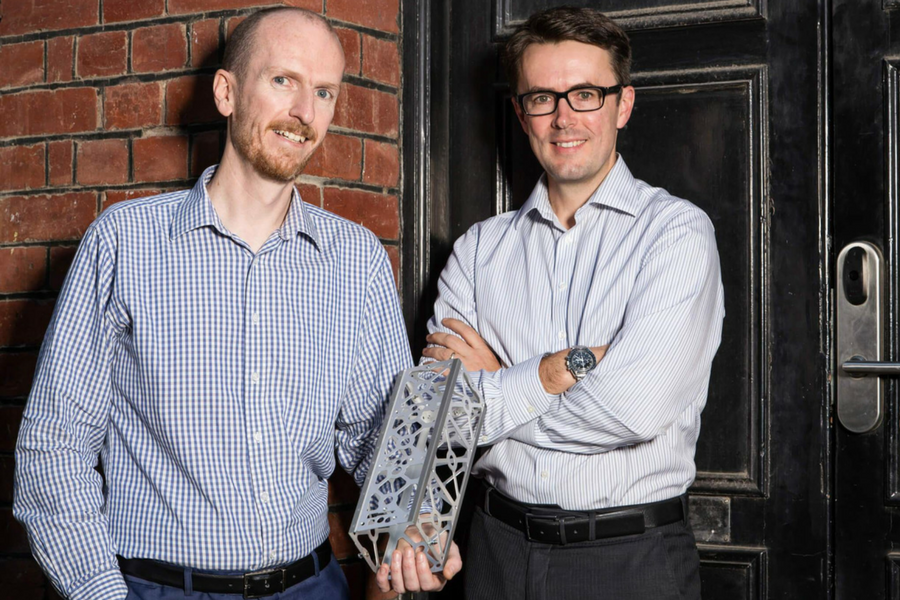Adelaide space startup Myriota has raised US$15 million ($19.35 million) in a Series A round led Blue Sky Venture Capital and the CSIRO’s Main Sequence Ventures, with participation from firms including Right Click Capital and Boeing through its HorizonX Ventures arm.
Spun out of the University of Adelaide in 2015, Myriota works with low-earth orbit nanosatellites and ground-based micro-transmitters to enable low-powered, two-way communication, allowing for the low-cost sharing of data to and from remote locations.
With the nanosatellites the startup is currently working with operated by Canadian outfit ExactEarth, which previously led Myriota’s seed round, the startup’s technology has already been deployed for the likes of water monitoring, environmental monitoring, and defence.
The funding will go towards the launching of more nanosatellites, with the startup working to develop its own; its first was set to launch with SpaceX last month, however the launch was delayed due to bad weather.
Myriota is also planning to make 50 new hires; while new sales and customer support offices will be opened in North America and Asia, most of the new team members will join the startup at its South Australian headquarters.
Dr Alex Grant, CEO of Myriota, said the startup is excited to have global investors on board to help support its mission.
“We formed Myriota to solve a major connectivity problem: hundreds of millions of devices that need to communicate but don’t have cost-effective, battery-friendly networks to do so,” he said.
“The scale of this investment, with strong domestic venture capital leadership and strategic participation by global investors is significant for Myriota, and our vision to deliver IoT connectivity for everyone, everywhere.”
Atlanta Daniel, Investment Director at Blue Sky’s South Australian VC Fund, said the firm has been impressed by the startup’s global outlook from day one.
“They’re proof that South Australia has exceptional entrepreneurs and world-class technology companies looking for investment. Over the past few months we’ve worked hard alongside Myriota to help the team secure foreign direct investment from North America and Asia,” she said.
“We’re excited to see this kind of global platform technology emerge from South Australia, where the team have effectively developed a new protocol for IoT communications, enabled by ‘New Space’ technology.”
With Myriota marking the first investment in a startup outside the US for Boeing’s HorizonX, which launched last April, vice president of Boeing HorizonX Steve Nordlund said the firm is proud to support Australia’s startup ecosystem and growing space industry.
“Part of the mission of Boeing HorizonX is to pursue and accelerate innovations coming out of startups around the world…Myriota’s technology influences how we think about space-based communications and connectivity in remote locations,” he said.
The investment for Myriota comes a month after it announced it will be opening at IoT lab in Adelaide, with its own investment of $1.36 million and a matched grant from the South Australian government.
The startup also last September won a contract from the Federal Government to develop a personal, black-box style ‘Flight Recorders’ for the Army.
To be developed in partnership with wearable technology company IMeasureU, the Flight Recorders will allow satellites to determine the exact location of injured soldiers, reducing the time to reach and treat them, and record information from the field.
Myriota is one of a growing number of space startups emerging out of Australia.
Also based out of Adelaide and working with nanosatellites is Fleet, which last year raised $5 million from investors including Blackbird Ventures and Mike Cannon-Brookes to further its work to launch a network of more than 100 nanosatellites to create a global network enabling low-bandwidth connectivity for IoT devices.
Blackbird Ventures also last year led a $5 million raise for Gilmour Space Technologies, which looks to provide an affordable path to space launches with its hybrid-engine rockets, which use 3D printed, or “additively manufactured”, fuel.
With the sector long having lobbied for a national space agency for Australia, these investments helped further the cause.
A review into Australia’s space industry capabilities was ordered by former Minister for Innovation, Arthur Sinodinos last July, with then-Acting, now current Minister for Innovation, Michaelia Cash in September announcing that the government would be launching a national space agency.
Cash said at the time, “The global space industry is growing rapidly and it’s crucial that Australia is part of this growth. A national space agency will ensure we have a strategic long-term plan that supports the development and application of space technologies and grows our domestic space industry.”
With a working group set to make its recommendations to government around the potential structure of the agency by the end of this month, the CSIRO in January announced an expansion of its long-running partnership with Boeing that will see the two bodies perform joint research and development in space technologies.
The CSIRO stated the research will explore opportunities for space infrastructure and ground-based space facilities in Australia “that could be beneficial for a range of space-related activities”, with scientists from Australia and the US to collaborate on the developing needs of the Australian space market.
Jim Chilton, senior vice president of Boeing Space and Missile Systems, said at the time, “Now with Australia on the cusp of its own exciting space age, Boeing couldn’t have a better Australian R&D partner than CSIRO to work with on emerging space technologies.”
Image: Dr David Haley and Dr Alex Grant. Source: Myriota.




















Trending
Daily startup news and insights, delivered to your inbox.